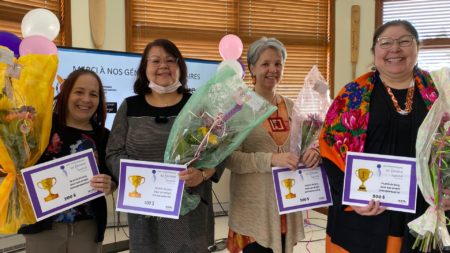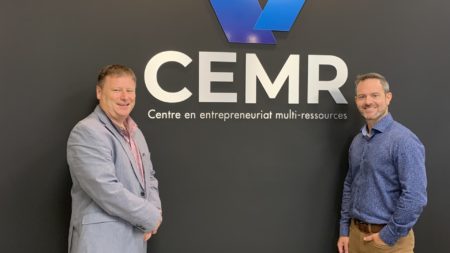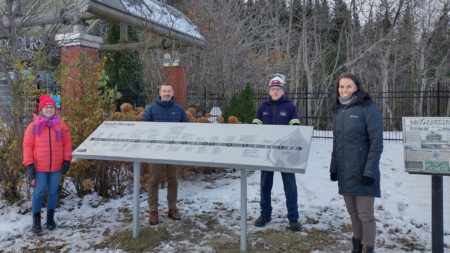Spotlight on Cultural Wealth at the Mashteuiatsh Women’s Entrepreneurial Camp

The four participants who completed their business plans as part of the entrepreneurial camp: Marie-Ève Robertson, Francine Dominique, Nathalie Kurtness, and Doris Bossum. They each received a grant from Rio Tinto.
The Mashteuiatsh women’s entrepreneurial camp (Camp entrepreneurial au Féminin), an initiative of the Société de développement économique Ilnu (SDEI), has been held annually for the past three years. It gives women of the Mashteuiatsh community a chance to develop their entrepreneurial spirit and find their place in the business world. Attracted by this initiative, the Regional Economic Development (RED)provides financial support in the form of grants but also meets with the inspiring participants. This is a most rewarding partnership based on sharing, human capital, and the cultural wealth of a people.
The camp was created in 2019 to give women the opportunity to start their own business. “We noticed that women’s participation in our business service activities was low,” said Louise Bergeron, Director of Business and Financial Administration, SDEI. “So, we started to think about what we could do to encourage more women to start a business. We held an awareness day and then organised a happy hour with two businesswomen from the community. Following these gatherings, women showed interest in developing their entrepreneurial spirit, and the SDEI was there to help. These various actions have been so successful that the number of women consulting the business services department has jumped from 300 to 650.”
Camps adapted to the needs of the community
Each year’s camp is designed around the needs of the women and their projects. In the first edition year, the SDEI organised workshops for the women to get to know themselves better so they could further develop their projects. The second edition was quite different as, due to the pandemic, it took place entirely online. But in 2021, the camp returned in force—for this third edition, the SDEI decided to take it to the next level by inviting the women to develop a complete business plan. The camp was held over six months in a hybrid online/in-person format, with one day of activities every two weeks. Four of the seven registered participants successfully completed their project.
Meaningful, heartfelt projects
Each of the projects was driven by the desire to not only shine a light on Indigenous culture, but also raise awareness of the community’s social issues.
We were deeply moved by the community businesswomen’s projects and presentations,” said Luc Cyrenne, Project Director, at RED. “They were eloquent and spoke from the heart. We are honoured to contribute to the success of these entrepreneurial projects—I have no doubt that they will all take off, and we are proud to participate in their realisation.”
Ms. Bergeron added, “I find that a great respect has been built with the RED people since the first edition of the camp. They don’t just write a cheque—they take the time to get involved and meet the women; they are interested, and they listen. Beyond the grants, their hands-on contribution is very valuable.”
The camp also gives women an opportunity to express their pride in their community, the origins of which are reflected in their entrepreneurial projects. Ms. Bergeron went on to say, “These women want to raise public awareness of the lack of knowledge and understanding of the various social problems that exist in the community. They care about their culture and make it their duty to preserve it through forward-looking projects.”
At the end of the camp, the RED awarded participants four grants, for a total of $5,000. Here is the list of recipients:
- Marie-Ève Robertson – $200 jury prize – $2,000 RIO TINTO grant
- Francine Dominique – $100 jury prize – $1,000 RIO TINTO grant
- Nathalie Kurtness – $300 jury prize – $1,000 RIO TINTO grant
- Doris Bossum – $500 jury prize – $1,000 RIO TINTO grant


